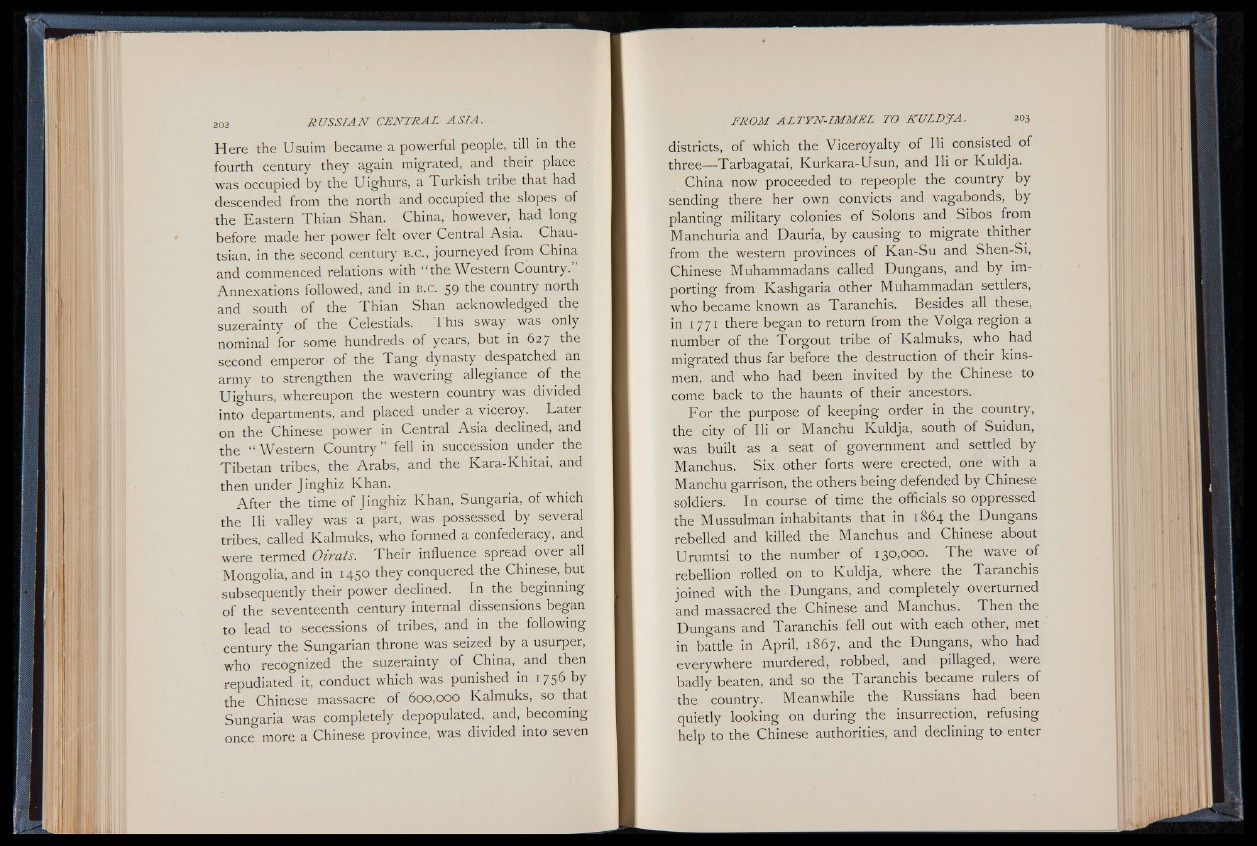
Here the Usuim became a powerful people, till in the
fourth century they again migrated, and their place
was occupied by the Uighurs, a Turkish tribe that had
descended from the north and occupied the slopes of
the Eastern Thian Shan. China, however, had long
before made her power felt over Central Asia. Chau-
tsian, in the second century B .C ., journeyed from China
and commenced relations with “ the Western Country.
Annexations followed, and in B .C . 59 the country north
and south of the Thian Shan acknowledged the
suzerainty of the Celestials. This sway was only
nominal for some hundreds of years, but in 627 the
second emperor of the Tang dynasty despatched an
army to strengthen the wavering allegiance of the
Uighurs, whereupon the western country was divided
into departments, and placed under a viceroy. Later
on the Chinese power in Central Asia declined, and
the “ Western Country” fell in succession under the
Tibetan tribes, the Arabs, and the Kara-Khitai, and
then under Jinghiz Khan.
After the time of Jinghiz Khan, Sungaria, of which
the Ili valley was a part, was possessed by several
tribes, called Kalmuks, who formed a confederacy, and
were termed Oirats. Their influence spread over all
Mongolia, and in 145° they conquered the Chinese, but
subsequently their power declined. In the beginning
of the seventeenth century internal dissensions began
to lead to secessions of tribes, and in the following
century the Sungarian throne was seized by a usurper,
who recognized the suzerainty of China, and then
repudiated it, conduct which was punished in 1756 by
the Chinese massacre of 600,000 Kalmuks, so that
Sungaria was completely depopulated, and, becoming
once more a Chinese province, was divided into seven
districts, of which the Viceroyalty of Ili consisted of
three— Tarbagatai, Kurkara-Usun, and Ili or Kuldja.
China now proceeded to repeople the country by
sending there her own convicts and vagabonds, by
planting military colonies of Solons and Sibos from
Manchuria and Dauria, by causing to migrate thither
from the western provinces of Kan-Su and Shen-Si,
Chinese Muhammadans called Durtgans, and by importing
from Kashgaria other Muhammadan settlers,
who became known as Taranchis, Besides all these,
in 17 71 there began to return from the Volga region a
number of the Torgout tribe of Kalmuks, who had
migrated thus far before the destruction of their kinsmen,
and who had been invited by the Chinese to
come back to the haunts of their ancestors.
For the purpose of keeping order in the country,
the city of Ili or Manchu Kuldja, south of Suidun,
was built as a seat of government and settled by
Manchus. Six other forts were erected, one with a
Manchu garrison, the others being defended by Chinese
soldiers. I n course of time the officials so oppressed
the Mussulman inhabitants that in 1864 the Dungans
rebelled and killed the Manchus and Chinese about
Urumtsi to the number of 130,000. The wave of
rebellion rolled on to Kuldja, where the Taranchis
joined with the Dungans, and completely overturned
and massacred the Chinese and Manchus. Then the
Dungans and Taranchis fell out with each other, met
in battle in April, 1867, and the Dungans, who had
everywhere murdered, robbed, and pillaged, were
badly beaten, and so the Taranchis became rulers of
the country. Meanwhile the Russians had been
quietly looking on during the insurrection, refusing
help to the Chinese authorities, and declining to enter